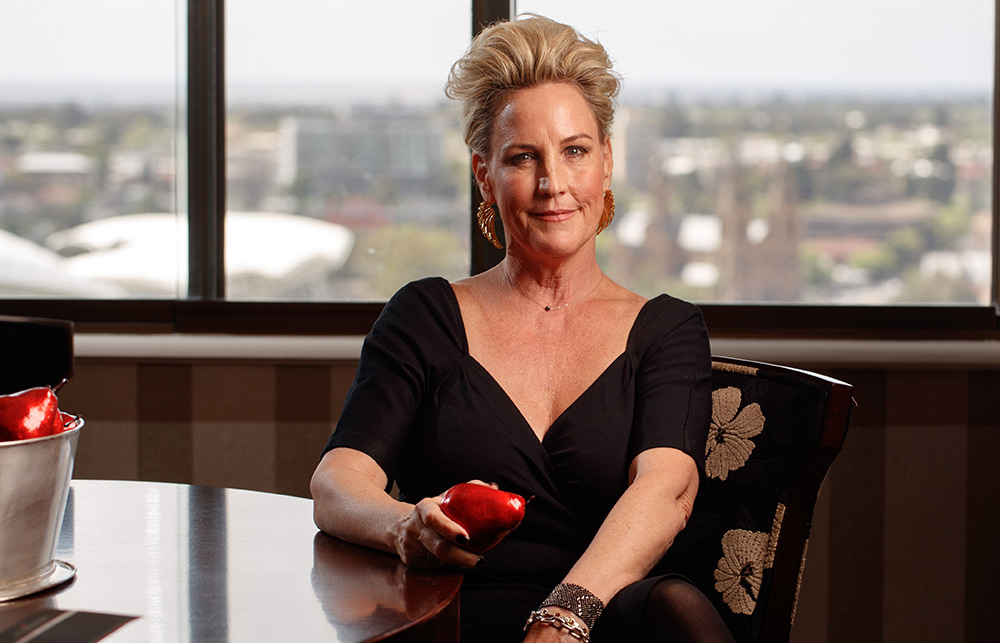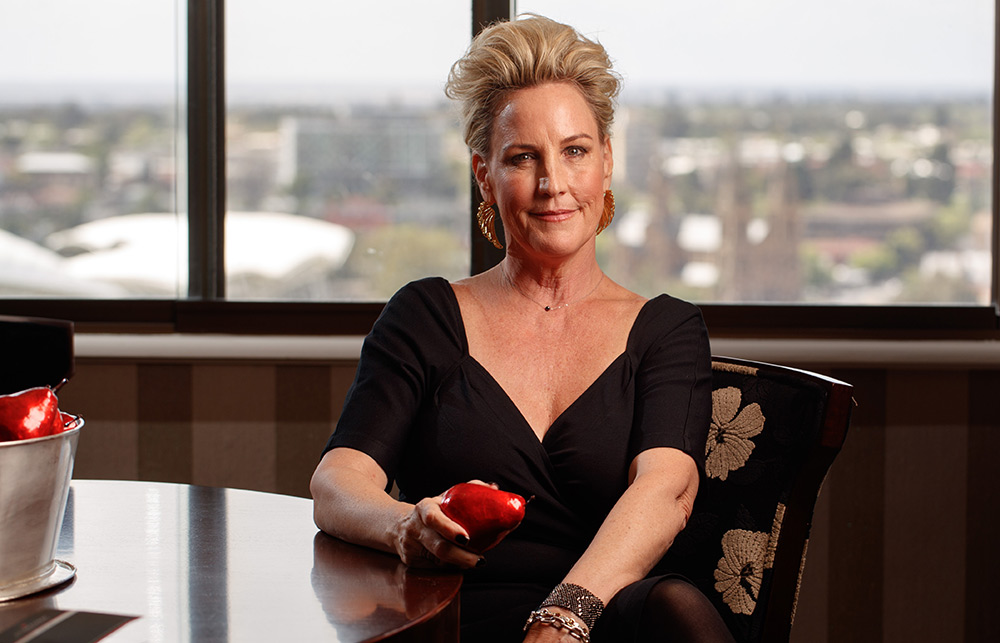
在公眾眼中,艾琳?布羅克維奇就像是巔峰時(shí)期的電影明星茱莉亞?羅伯茨:她性格堅(jiān)毅,身材豐滿,她在加利福尼亞州欣克利對抗拒絕對水源被嚴(yán)重污染承擔(dān)責(zé)任的邪惡公司,從它們手中拯救鄰居。20年前,我們心目中的這位女士,被史蒂文?索德伯格拍成了一部130分鐘的優(yōu)秀故事片《永不妥協(xié)》(Erin Brockovich),電影有圓滿的結(jié)局。
許多人認(rèn)為,2014年的弗林特水污染危機(jī)同樣得到了圓滿解決。這件事在媒體上曝光,宣傳的主力是新聞機(jī)構(gòu)而不是“金棕櫚獎”獲獎導(dǎo)演。我們聽說,當(dāng)?shù)氐乃幢汇U污染,水質(zhì)非常糟糕。時(shí)任美國總統(tǒng)貝拉克?奧巴馬親自去了弗林特。他在鏡頭前喝了當(dāng)?shù)氐乃缓筮@件事就被我們拋在了腦后。很好的新聞周期,或許結(jié)局也算圓滿,對吧?人們并不確定事情的結(jié)果,但我們很容易以為,既然問題已經(jīng)曝光,肯定正在得到妥善處理。然而事實(shí)并非如此:六年過去了,問題仍未得到解決。
這是現(xiàn)實(shí)世界里現(xiàn)年60歲的艾琳?布羅克維奇,希望人們知道的真相。她表示,美國環(huán)境保護(hù)署和美國內(nèi)政部的聯(lián)邦監(jiān)督,不可能解決美國的環(huán)境問題。對1974年的《安全飲用水法》(Safe Drinking Water Act)等聯(lián)邦政策的修改毫無效果。民眾的注意力持續(xù)時(shí)間并不足以看穿真正的問題所在。2010年深水地平線漏油事件之后,當(dāng)媒體不再關(guān)注此事,居民們只能靠自己保護(hù)自己。沒有任何超級英雄出現(xiàn)。
布羅克維奇在最新出版的《超人不會來:美國的水危機(jī)與國民的應(yīng)對之道》(Superman’s Not Coming: Our National Water Crisis and What We the People Can Do About It)中指出,要帶來真正的改變,保護(hù)美國的水道,唯一的辦法是通過漫長的基層和社區(qū)行動。
她告訴《財(cái)富》雜志:“我在從事基層工作的過程中學(xué)到了這一點(diǎn):我們或許是過于自我感覺良好或者自滿,總是以為會有某個(gè)人或者某個(gè)東西能解決問題。這是一個(gè)緩慢覺醒的過程。我們要自己站出來抗?fàn)帯!?/p>
以下對話內(nèi)容略有編輯。
從弗林特水污染危機(jī)引起全國關(guān)注已經(jīng)過去了六年。為什么這么重大的事情會銷聲匿跡,沒有任何切實(shí)的行動?
艾琳?布羅克維奇:首先我想談一談,電影(《永不妥協(xié)》,2000年)上映的時(shí)候給我的一些啟示。電影里描述的事情一度引起了轟動,后來熱度下降,但依舊不斷有人給我寫電子郵件。全國不止有一個(gè)欣克利,而是有無數(shù)個(gè)這樣的地方。有些媒體的表現(xiàn)讓我非常失望:他們會拋出一些言論摘要,但如果事情沒有更多吸引眼球的新聞價(jià)值,他們就會離開。后來發(fā)生了弗林特的事情。當(dāng)時(shí)所有人都感到非常不安,因?yàn)槲覀円詾檫@些媒體會來保護(hù)我們。但他們?nèi)チ四睦铮扛チ痔匾苍?jīng)引起廣泛關(guān)注,但它逐漸淡出了人們的視野,因?yàn)樾侣勚芷诎l(fā)生了變化。
我們不希望有類似的遭遇,盡管這種事情有可能會發(fā)生。我們認(rèn)為仍然會有一些媒體來保護(hù)我們,而且多年來政府出臺的政策,其設(shè)計(jì)目的也是希望我們不會發(fā)現(xiàn)媒體不會保護(hù)我們。
以弗林特的鉛和銅監(jiān)管規(guī)則為例。這些規(guī)則規(guī)定,你只需每四年一次進(jìn)行鉛含量檢測,并且可以使用樣本的平均值。這意味著會有大量數(shù)據(jù)被遺漏。這些過時(shí)的環(huán)境政策必須改革,但現(xiàn)任美國政府并不熱衷于環(huán)境保護(hù)。水資源與基礎(chǔ)設(shè)施一樣極其重要,解決這些問題要付出巨大的代價(jià),因此人們要么對其置之不理,要么假設(shè)其他人會解決它,結(jié)果卻往往事與愿違。最終還是要靠我們自己。
您是否認(rèn)為監(jiān)管機(jī)構(gòu)變得過于政治化,無法執(zhí)行長遠(yuǎn)的、有意義的措施?
我們可以把50年間出現(xiàn)的所有問題歸咎于任何人和所有人,但這不會給我們帶來任何改變。我們只需要認(rèn)識到,是誰的責(zé)任并不重要,因?yàn)閱栴}已經(jīng)出現(xiàn),我們要做的是找到向前推進(jìn)的解決方案。我發(fā)現(xiàn),公司并不喜歡我們的解決方案,因?yàn)樗鼈冋J(rèn)為這會影響財(cái)務(wù)狀況,但這與事實(shí)相去甚遠(yuǎn)。我們需要重建基礎(chǔ)設(shè)施,讓人們重新回到工作當(dāng)中。曾經(jīng)那些讓美國變成一個(gè)偉大國家的東西,如今面臨著嚴(yán)重的危機(jī)。我們需要做的是少說廢話。水污染已經(jīng)發(fā)生,無論你來自哪個(gè)黨派,我們必須攜起手來,解決關(guān)乎所有人命運(yùn)的這個(gè)簡單問題。
現(xiàn)在似乎存在兩種觀點(diǎn):一種觀點(diǎn)認(rèn)為我們需要聯(lián)邦政府迅速采取大規(guī)模行動,可以與企業(yè)合作,另外一種觀點(diǎn)是……
不能指望聯(lián)邦政府。我們可以在地方層面開展行動。
是的。我想說的是另外一種觀點(diǎn)認(rèn)為,聯(lián)邦政府在短期內(nèi)很難有所行動,所以可以與地方社區(qū)合作,保護(hù)環(huán)境和水道。您認(rèn)為這是權(quán)宜之計(jì)嗎?
不,必須從地方層面著手。我認(rèn)為現(xiàn)在的情況是,聯(lián)邦層面的攤子太大,因此沒有民眾和地方市議會的參與,聯(lián)邦政府難有作為。
我建議人們?nèi)⒓赢?dāng)?shù)氐氖凶h會會議。我曾經(jīng)親眼見證過人們在這種會議上所展現(xiàn)出來的力量。有時(shí)候,這些城市的議會或許并不清楚發(fā)生了什么,而且他們擁有很大的權(quán)利進(jìn)行改革,或者修改法規(guī)。讓我們從基層著手解決問題。美國每個(gè)城市的政府都應(yīng)該這樣做。你可以從國家層面解決問題,但在地方層面,在你自己的家園,[你可以采取行動]不要等著其他人出手。
人們應(yīng)該怎么做?
人們只需要決定:這是我的水源;這是我的家園。積極參與,了解事情的真相。只需要打個(gè)電話。就是這么簡單。
以紐約州的波基普西為例。當(dāng)?shù)厝税l(fā)現(xiàn)水質(zhì)有變化后,紛紛撥打電話。調(diào)查發(fā)現(xiàn)水廠在自來水中使用了含氨原料,他們停止使用之后,市民不再投訴。只要他們重新使用,人們就會打電話問:“發(fā)生了什么?”
人們的態(tài)度正在發(fā)生改變。這是你最早能做的事情之一,你或許以為這微不足道,但事實(shí)并非如此。你必須參與進(jìn)來,而且要積極主動。只要你發(fā)現(xiàn)了問題,就要把它曝光。因?yàn)橹灰阏f出來,你就可以學(xué)到一些知識,而知識就是力量。只要你邁出一小步,星星之火就能燎原。你會因此獲得巨大的力量。
在有大量少數(shù)族裔的社區(qū)推行環(huán)境保護(hù)是不是一件容易的事?人們能聽到或者愿意傾聽他們的聲音嗎?
環(huán)境種族主義一直存在;這個(gè)問題源于許多社會經(jīng)濟(jì)因素。
即使在欣克利,我經(jīng)常想起人們說的一句話是:“你不是醫(yī)生,不是律師,也不是科學(xué)家。你只是穿著短裙東奔西走。為什么人們要相信你?”
我想生而為人,我并不需要有這些身份。這種令人壓抑的情況在這些少數(shù)族裔社區(qū)里隨處可見。這些社區(qū)里的人被告知,他們看到的和經(jīng)歷的事情不是真的,這讓人非常沮喪。最后,人們變得疲憊不堪,然后認(rèn)為這是命中注定的事情。你必須與基層的民眾建立聯(lián)系,確認(rèn)是否真得發(fā)生了他們所說的情況。他們只想過好自己的生活;他們沒有編造瘋狂的故事。國家領(lǐng)導(dǎo)人和社會現(xiàn)實(shí)之間出現(xiàn)了嚴(yán)重脫節(jié)。但在每一個(gè)縣市,還有無數(shù)像你我這樣的普通市民。你可以每天給市政府打15次電話,也可以聯(lián)系我們。我們會找媒體跟進(jìn)。
在全國削減警察預(yù)算的運(yùn)動中,許多美國人意識到了市議會的重要性,以及地方政府對于他們的日常生活的影響力。
確實(shí)如此,而且你能夠看到各種組織意識到,他們在地方上可以大有作為。重要的是,我們要去參加市議會,因?yàn)橛袝r(shí)候議會并不清楚發(fā)生了什么,而我們需要到現(xiàn)場去告訴他們。想象一下,如果每個(gè)城市的社區(qū)都能夠積極參與市議會,會發(fā)生什么?你將改變自己的家園,并帶動整個(gè)國家做出改變。
您從事環(huán)保事業(yè)已經(jīng)很長時(shí)間,而這似乎是一場永遠(yuǎn)沒有結(jié)束的戰(zhàn)爭。您如何避免讓自己感覺精力枯竭?如何始終保持積極的心態(tài)?
我們生活在一個(gè)瘋狂的世界,為了不讓自己同流合污,你必須停下來恢復(fù)狀態(tài)。當(dāng)你無法呼吸的時(shí)候,你會失去前進(jìn)的動力。我允許自己有沮喪的時(shí)候,可以大聲呼喊:“再見。別煩我。”我也會不接電話,不會因?yàn)橛袔滋鞎簳r(shí)放棄而有負(fù)罪感。我不會因?yàn)樽约翰皇桥硕⒐⒂趹选?/p>
幾年前,我一度以為我無法繼續(xù)從事這項(xiàng)事業(yè)。我不知道事情該如何推進(jìn),我覺得有些力不從心。但后來我的第一個(gè)孫子的出生,讓我重新充滿了斗志,我要努力維護(hù)更好的環(huán)境。這對于我來說,不需要花費(fèi)心思糾結(jié)。我這樣做并不是基于科學(xué);而是因?yàn)橐粋€(gè)基本的簡單事實(shí):地球是我們的家園。我們有義務(wù)讓我們賴以生存的這個(gè)星球恢復(fù)生機(jī)。地球已經(jīng)不堪重負(fù),或許我們應(yīng)該接過保護(hù)地球的重?fù)?dān)。
所以,累的時(shí)候不必硬撐。這是正常的。我們并不完美。我們確實(shí)會疲勞,會感到精疲力盡。允許自己感到疲倦,等到明天再重新振作起來,繼續(xù)努力。(財(cái)富中文網(wǎng))
翻譯:劉進(jìn)龍
審校:汪皓

在公眾眼中,艾琳?布羅克維奇就像是巔峰時(shí)期的電影明星茱莉亞?羅伯茨:她性格堅(jiān)毅,身材豐滿,她在加利福尼亞州欣克利對抗拒絕對水源被嚴(yán)重污染承擔(dān)責(zé)任的邪惡公司,從它們手中拯救鄰居。20年前,我們心目中的這位女士,被史蒂文?索德伯格拍成了一部130分鐘的優(yōu)秀故事片《永不妥協(xié)》(Erin Brockovich),電影有圓滿的結(jié)局。
許多人認(rèn)為,2014年的弗林特水污染危機(jī)同樣得到了圓滿解決。這件事在媒體上曝光,宣傳的主力是新聞機(jī)構(gòu)而不是“金棕櫚獎”獲獎導(dǎo)演。我們聽說,當(dāng)?shù)氐乃幢汇U污染,水質(zhì)非常糟糕。時(shí)任美國總統(tǒng)貝拉克?奧巴馬親自去了弗林特。他在鏡頭前喝了當(dāng)?shù)氐乃缓筮@件事就被我們拋在了腦后。很好的新聞周期,或許結(jié)局也算圓滿,對吧?人們并不確定事情的結(jié)果,但我們很容易以為,既然問題已經(jīng)曝光,肯定正在得到妥善處理。然而事實(shí)并非如此:六年過去了,問題仍未得到解決。
這是現(xiàn)實(shí)世界里現(xiàn)年60歲的艾琳?布羅克維奇,希望人們知道的真相。她表示,美國環(huán)境保護(hù)署和美國內(nèi)政部的聯(lián)邦監(jiān)督,不可能解決美國的環(huán)境問題。對1974年的《安全飲用水法》(Safe Drinking Water Act)等聯(lián)邦政策的修改毫無效果。民眾的注意力持續(xù)時(shí)間并不足以看穿真正的問題所在。2010年深水地平線漏油事件之后,當(dāng)媒體不再關(guān)注此事,居民們只能靠自己保護(hù)自己。沒有任何超級英雄出現(xiàn)。
布羅克維奇在最新出版的《超人不會來:美國的水危機(jī)與國民的應(yīng)對之道》(Superman’s Not Coming: Our National Water Crisis and What We the People Can Do About It)中指出,要帶來真正的改變,保護(hù)美國的水道,唯一的辦法是通過漫長的基層和社區(qū)行動。
她告訴《財(cái)富》雜志:“我在從事基層工作的過程中學(xué)到了這一點(diǎn):我們或許是過于自我感覺良好或者自滿,總是以為會有某個(gè)人或者某個(gè)東西能解決問題。這是一個(gè)緩慢覺醒的過程。我們要自己站出來抗?fàn)帯!?/p>
以下對話內(nèi)容略有編輯。
從弗林特水污染危機(jī)引起全國關(guān)注已經(jīng)過去了六年。為什么這么重大的事情會銷聲匿跡,沒有任何切實(shí)的行動?
艾琳?布羅克維奇:首先我想談一談,電影(《永不妥協(xié)》,2000年)上映的時(shí)候給我的一些啟示。電影里描述的事情一度引起了轟動,后來熱度下降,但依舊不斷有人給我寫電子郵件。全國不止有一個(gè)欣克利,而是有無數(shù)個(gè)這樣的地方。有些媒體的表現(xiàn)讓我非常失望:他們會拋出一些言論摘要,但如果事情沒有更多吸引眼球的新聞價(jià)值,他們就會離開。后來發(fā)生了弗林特的事情。當(dāng)時(shí)所有人都感到非常不安,因?yàn)槲覀円詾檫@些媒體會來保護(hù)我們。但他們?nèi)チ四睦铮扛チ痔匾苍?jīng)引起廣泛關(guān)注,但它逐漸淡出了人們的視野,因?yàn)樾侣勚芷诎l(fā)生了變化。
我們不希望有類似的遭遇,盡管這種事情有可能會發(fā)生。我們認(rèn)為仍然會有一些媒體來保護(hù)我們,而且多年來政府出臺的政策,其設(shè)計(jì)目的也是希望我們不會發(fā)現(xiàn)媒體不會保護(hù)我們。
以弗林特的鉛和銅監(jiān)管規(guī)則為例。這些規(guī)則規(guī)定,你只需每四年一次進(jìn)行鉛含量檢測,并且可以使用樣本的平均值。這意味著會有大量數(shù)據(jù)被遺漏。這些過時(shí)的環(huán)境政策必須改革,但現(xiàn)任美國政府并不熱衷于環(huán)境保護(hù)。水資源與基礎(chǔ)設(shè)施一樣極其重要,解決這些問題要付出巨大的代價(jià),因此人們要么對其置之不理,要么假設(shè)其他人會解決它,結(jié)果卻往往事與愿違。最終還是要靠我們自己。
您是否認(rèn)為監(jiān)管機(jī)構(gòu)變得過于政治化,無法執(zhí)行長遠(yuǎn)的、有意義的措施?
我們可以把50年間出現(xiàn)的所有問題歸咎于任何人和所有人,但這不會給我們帶來任何改變。我們只需要認(rèn)識到,是誰的責(zé)任并不重要,因?yàn)閱栴}已經(jīng)出現(xiàn),我們要做的是找到向前推進(jìn)的解決方案。我發(fā)現(xiàn),公司并不喜歡我們的解決方案,因?yàn)樗鼈冋J(rèn)為這會影響財(cái)務(wù)狀況,但這與事實(shí)相去甚遠(yuǎn)。我們需要重建基礎(chǔ)設(shè)施,讓人們重新回到工作當(dāng)中。曾經(jīng)那些讓美國變成一個(gè)偉大國家的東西,如今面臨著嚴(yán)重的危機(jī)。我們需要做的是少說廢話。水污染已經(jīng)發(fā)生,無論你來自哪個(gè)黨派,我們必須攜起手來,解決關(guān)乎所有人命運(yùn)的這個(gè)簡單問題。
現(xiàn)在似乎存在兩種觀點(diǎn):一種觀點(diǎn)認(rèn)為我們需要聯(lián)邦政府迅速采取大規(guī)模行動,可以與企業(yè)合作,另外一種觀點(diǎn)是……
不能指望聯(lián)邦政府。我們可以在地方層面開展行動。
是的。我想說的是另外一種觀點(diǎn)認(rèn)為,聯(lián)邦政府在短期內(nèi)很難有所行動,所以可以與地方社區(qū)合作,保護(hù)環(huán)境和水道。您認(rèn)為這是權(quán)宜之計(jì)嗎?
不,必須從地方層面著手。我認(rèn)為現(xiàn)在的情況是,聯(lián)邦層面的攤子太大,因此沒有民眾和地方市議會的參與,聯(lián)邦政府難有作為。
我建議人們?nèi)⒓赢?dāng)?shù)氐氖凶h會會議。我曾經(jīng)親眼見證過人們在這種會議上所展現(xiàn)出來的力量。有時(shí)候,這些城市的議會或許并不清楚發(fā)生了什么,而且他們擁有很大的權(quán)利進(jìn)行改革,或者修改法規(guī)。讓我們從基層著手解決問題。美國每個(gè)城市的政府都應(yīng)該這樣做。你可以從國家層面解決問題,但在地方層面,在你自己的家園,[你可以采取行動]不要等著其他人出手。
人們應(yīng)該怎么做?
人們只需要決定:這是我的水源;這是我的家園。積極參與,了解事情的真相。只需要打個(gè)電話。就是這么簡單。
以紐約州的波基普西為例。當(dāng)?shù)厝税l(fā)現(xiàn)水質(zhì)有變化后,紛紛撥打電話。調(diào)查發(fā)現(xiàn)水廠在自來水中使用了含氨原料,他們停止使用之后,市民不再投訴。只要他們重新使用,人們就會打電話問:“發(fā)生了什么?”
人們的態(tài)度正在發(fā)生改變。這是你最早能做的事情之一,你或許以為這微不足道,但事實(shí)并非如此。你必須參與進(jìn)來,而且要積極主動。只要你發(fā)現(xiàn)了問題,就要把它曝光。因?yàn)橹灰阏f出來,你就可以學(xué)到一些知識,而知識就是力量。只要你邁出一小步,星星之火就能燎原。你會因此獲得巨大的力量。
在有大量少數(shù)族裔的社區(qū)推行環(huán)境保護(hù)是不是一件容易的事?人們能聽到或者愿意傾聽他們的聲音嗎?
環(huán)境種族主義一直存在;這個(gè)問題源于許多社會經(jīng)濟(jì)因素。
即使在欣克利,我經(jīng)常想起人們說的一句話是:“你不是醫(yī)生,不是律師,也不是科學(xué)家。你只是穿著短裙東奔西走。為什么人們要相信你?”
我想生而為人,我并不需要有這些身份。這種令人壓抑的情況在這些少數(shù)族裔社區(qū)里隨處可見。這些社區(qū)里的人被告知,他們看到的和經(jīng)歷的事情不是真的,這讓人非常沮喪。最后,人們變得疲憊不堪,然后認(rèn)為這是命中注定的事情。你必須與基層的民眾建立聯(lián)系,確認(rèn)是否真得發(fā)生了他們所說的情況。他們只想過好自己的生活;他們沒有編造瘋狂的故事。國家領(lǐng)導(dǎo)人和社會現(xiàn)實(shí)之間出現(xiàn)了嚴(yán)重脫節(jié)。但在每一個(gè)縣市,還有無數(shù)像你我這樣的普通市民。你可以每天給市政府打15次電話,也可以聯(lián)系我們。我們會找媒體跟進(jìn)。
在全國削減警察預(yù)算的運(yùn)動中,許多美國人意識到了市議會的重要性,以及地方政府對于他們的日常生活的影響力。
確實(shí)如此,而且你能夠看到各種組織意識到,他們在地方上可以大有作為。重要的是,我們要去參加市議會,因?yàn)橛袝r(shí)候議會并不清楚發(fā)生了什么,而我們需要到現(xiàn)場去告訴他們。想象一下,如果每個(gè)城市的社區(qū)都能夠積極參與市議會,會發(fā)生什么?你將改變自己的家園,并帶動整個(gè)國家做出改變。
您從事環(huán)保事業(yè)已經(jīng)很長時(shí)間,而這似乎是一場永遠(yuǎn)沒有結(jié)束的戰(zhàn)爭。您如何避免讓自己感覺精力枯竭?如何始終保持積極的心態(tài)?
我們生活在一個(gè)瘋狂的世界,為了不讓自己同流合污,你必須停下來恢復(fù)狀態(tài)。當(dāng)你無法呼吸的時(shí)候,你會失去前進(jìn)的動力。我允許自己有沮喪的時(shí)候,可以大聲呼喊:“再見。別煩我。”我也會不接電話,不會因?yàn)橛袔滋鞎簳r(shí)放棄而有負(fù)罪感。我不會因?yàn)樽约翰皇桥硕⒐⒂趹选?/p>
幾年前,我一度以為我無法繼續(xù)從事這項(xiàng)事業(yè)。我不知道事情該如何推進(jìn),我覺得有些力不從心。但后來我的第一個(gè)孫子的出生,讓我重新充滿了斗志,我要努力維護(hù)更好的環(huán)境。這對于我來說,不需要花費(fèi)心思糾結(jié)。我這樣做并不是基于科學(xué);而是因?yàn)橐粋€(gè)基本的簡單事實(shí):地球是我們的家園。我們有義務(wù)讓我們賴以生存的這個(gè)星球恢復(fù)生機(jī)。地球已經(jīng)不堪重負(fù),或許我們應(yīng)該接過保護(hù)地球的重?fù)?dān)。
所以,累的時(shí)候不必硬撐。這是正常的。我們并不完美。我們確實(shí)會疲勞,會感到精疲力盡。允許自己感到疲倦,等到明天再重新振作起來,繼續(xù)努力。(財(cái)富中文網(wǎng))
翻譯:劉進(jìn)龍
審校:汪皓
In the public’s mind, Erin Brockovich is Julia Roberts, a movie star in her prime: scrappy, busty, and working to save her neighbors in Hinkley, Calif., from evil corporations who deny their part in heavily contaminating water sources. For two decades, our image of who this woman is has been directed by Steven Soderbergh into a neat, 130-minute story with a happy ending.
It’s the same way many view the 2014 Flint water crisis. This time the story played out in the media, with news producers at the helm instead of a Palme d’Or–winning director. The water was bad, lead-tainted, we heard. Then-President Barack Obama went to Flint. He drank the water on camera, and we moved on. A neat news cycle, maybe with a happy ending? That part was unclear, but the problem had been highlighted, and it was easy to trust that it was now being taken care of. Except that it wasn’t: Six years later, problems are still arising.
That’s what the real Erin Brockovich, now 60, wants you to know. Federal oversight, by the Environmental Protection Agency and the Department of the Interior, she says, isn’t going to fix America’s environmental problems. Outdated rules like 1974’s Safe Drinking Water Act aren’t effective. The national attention span does not last long enough to see a true problem through. When the cameras turned off and news anchors left their posts on the Gulf Coast after 2010’s Deepwater Horizon oil spill, residents were left to fend for themselves. No superhero in sight.
In her latest book, Superman's Not Coming: Our National Water Crisis and What We the People Can Do About It, Brockovich argues that the only way to institute real change and protect American waterways is through prolonged grassroots and community-based action.
“This is what I learned on the ground with the people: that whether we got too comfortable or complacent, we thought that whoever it may be or whatever it may be would come and fix this,” she told Fortune. “It’s been a process for us to slowly wake up. We need to look to ourselves to rise up.”
The following conversation has been lightly edited.
It’s been six years since the Flint water crisis came to national attention. How does something this big fizzle away with no concrete action?
Erin Brockovich: I’d start with what I learned when the film came out (Erin Brockovich, 2000). There’s a big sensational moment, and things quiet down, but the emails still come in. Hinkley wasn’t one place; there are Hinkleys everywhere. I’ve felt really frustrated out there with some of the media: They’re going to get a sound bite, and then when this is no longer headline sensational news, these people are still left with this. And then Flint happened. It was a very unnerving moment for everybody because we think these agencies are here to protect us. But where were they? Flint was a moment, but it goes away because the news cycle changes.
The rest of us don’t want to think it could happen to us, even though it could. We think that there are still agencies in place to protect us, and over many years policies were written and designed in ways for us not to find out that they aren’t.
Let’s talk about those lead and copper rules in Flint. The rule states that you only have to test for lead once every four years and that you can average the samples. That means they’re going to miss a lot of data sets. You have to reform these antiquated environmental policies, and our current administration isn’t a fan of environmental protections. Water is one of those massive things, like infrastructure, where the cost is so extreme that people push stuff aside or assume that someone else will fix it, but they won’t. It’s up to us.
Do you think oversight agencies have become too politicized to take long term, meaningful action?
We can blame anybody and everybody over the course of 50 years for what went wrong, but that’s not going to get us anywhere. We just need to recognize that it doesn’t matter because the problems are already here, and we need to figure out what our solution is moving forward. I find that companies don’t always like the solution because they think it hurts their finances, but nothing could be further from the truth. We need to rebuild our infrastructure and put people back to work. These are the things that made America great that are now in deep peril. We need to just cut through the bullcrap. Water pollution is here, and I don’t care what side of the aisle you fall on. We must come together on one simple issue that makes or breaks every one of us.
There seem to be two ideas here: One is that we need the federal government to act quickly and on a large scale and perhaps partner with corporations and the other is…
You don’t. You can do it at a local level.
Right. I was going to say that the other idea is that it’s unlikely that will happen in the near future and so there are things that can be done within local communities to protect the environment and waterways. Do you view these as a stopgap measure?
No, it has to be done locally. I think what happens is that at the federal level the umbrella is so big that it would be impossible for them to get anything done without the involvement of the people and the local city council.
I encourage people to go to their city council meetings. We’ve seen the power of people showing up in numbers to those meetings. Sometimes these municipalities might not know what’s going on, and they have a lot of power to reform or change rules. Let’s fix the problems at ground zero. Every municipality in America should do that. You can solve the issue nationally, but at a local level, in your own backyard, [you can act] instead of waiting for someone to come do it.
So what should people do?
Just make the decision: It’s my water; it’s my backyard. Get involved and decide to learn about it. Just make a phone call. It’s that simple.
Look at Poughkeepsie, N.Y. The people there noticed a change in their water quality, and they called. It turns out there was an ammonia feed going into the tap water, and when they turned it off, the phone stopped ringing. They turned the feed back on, and people started calling again to say, “What’s going on?”
There’s a change happening. That’s one of the very first acts that you can take that you may feel is little, but it’s not. You have to be involved, and you have to be proactive. If you think something’s wrong, say something. Because when you do, you learn something, and knowledge is power. You take one small act, but it’s contagious. It’s very empowering.
Is this an easy thing for communities that have large minority populations to do? Are they as heard or listened to?
Environmental racism has been here for a long time; a lot of socioeconomic factors come into play.
Even in Hinkley, what always stood out in my mind was people saying, “You’re not a doctor. You’re not a lawyer. You’re not a scientist. You’re running around in a short skirt. Why should anybody believe you?”
I didn’t think I had to be any of those to be human. There’s this suppression that happens in these communities where people are told that what they’re seeing and experiencing isn’t real, and it’s very frustrating. Eventually people get exhausted, and they think that this is just their lot in life. You’ve got to connect with those people who are at ground zero and know what they’re saying is really happening. They just want to live their lives; they’re not making up crazy stories. There’s a gigantic disconnect between our leaders and what’s happening. But in all of these counties there is that one person—you are out there. Call your municipality 15 times a day. Call us. We’ll get the media involved and put the spotlight on them.
With movements across the country to defund the police, many Americans are now realizing how essential their city councils are and how much their local government can do to impact their everyday life.
Absolutely, and you do see groups realizing that you can make great change at a local level. It is a matter of us getting to the city council because sometimes they don’t know, and we need to show up and tell them. Imagine if every community at every city council level did that. You would initiate a change in your own backyard, and let it spread across the nation.
You’ve been at this for so long, and it seems like a never ending battle. How do you avoid feeling burned out? How do you stay positive?
We all are living in a crazy world, and in order to not spin out with it, you’ve got to stop and reboot. You can’t continue to be motivated if you can’t breathe. I allow myself to get frustrated, to cry, to say, “Peace out. Don’t bother me." I stop picking up my phone calls and don’t feel guilty that I dropped out for a few days. I forgive myself for not being able to be superwoman.
A few years ago I had a moment where I thought I couldn’t do this anymore. I didn’t know how I was going to make progress, and it felt too big. But then my first grandchild was born, and it reinvigorated me to fight for a better environment. It’s a no-brainer for me. It’s not science; it’s just a real basic simple fact: This planet is our home. We owe it to our home and our planet where we reside to be reinvigorated. She’s tired, and maybe we should pick up the torch a little.
So when you’re tired, be tired. It’s okay. We aren’t perfect. We do get tired; we’re all feeling exhausted. Allow that to happen, and then get out there and start working again tomorrow.






